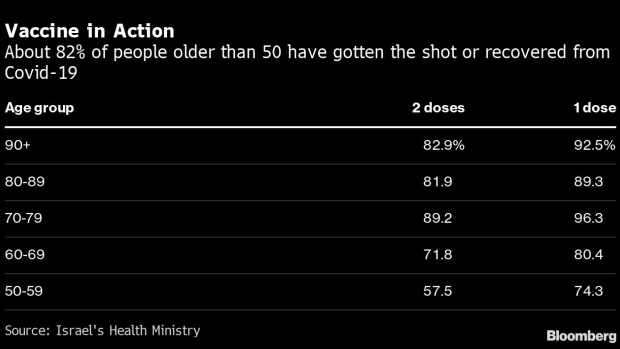Feb 16, 2021
World’s Fastest Vaccine Push Augurs Return to Normal in Israel
, Bloomberg News

(Bloomberg) -- Israel’s world-leading vaccination campaign is poised to achieve what millions in the country and many more outside it have desperately sought for a year: a return to normal life.
In the six weeks since Israel began administering the second dose of the Pfizer/BioNTech vaccine, about 80% of those at highest risk have been inoculated. As the numbers have grown, hospitals have reported a steady decline in seriously ill coronavirus patients and the rate of overall spread.
The Pfizer vaccine led to 94% fewer symptomatic illnesses and 92% fewer critically sick cases, according to a study of 1.2 million people by Israel’s largest health maintenance organization.
That success has spurred the government to ease restrictions on movement that have been in place for months. Next week, sporting and cultural events will be open to those who have been fully vaccinated, and everyone will be allowed to go to malls and shops.
“Israel is in a great place,” said Retsef Levi, a professor at the MIT Sloan School of Management and an adviser to Israeli cabinet members on Covid-19. “It has all the conditions to start attending to the enormous collateral damage that has been done to society over the last year.”
While the U.S., the European Union and most other places have had slow and disjointed rollouts, Israel raced ahead by securing millions of doses from Pfizer and exploiting its centralized health care system to rapidly distribute the shots.
For more, see Bloomberg’s Covid-19 Vaccine Tracker
Prime Minister Benjamin Netanyahu set a goal of inoculating most of the 6.5 million people older than 16 by the end of March, allowing the economy to completely reopen. About 4 million people -- 43% of residents -- have received at least one dose. Almost a third have gotten two doses.
The country isn’t done with the pandemic yet. Israel still has to inoculate holdouts among the elderly, and hospitals will likely see more new cases as the economy comes back to life, says Yael Haviv-Yadid, Director of the Coronavirus Critical Care Ward at Sheba Medical Center.
Though the nation’s largest hospital just closed a couple of wards for light cases, staff are still busy with critical ones. Young people account for a growing proportion of the seriously ill, due to the spread of the variant that surfaced in the U.K., coupled with lower vaccination rates in that age group, she said.
“There are young people who think nothing will happen to them,” Haviv-Yadid said. “But we have to keep watching our health.”
©2021 Bloomberg L.P.